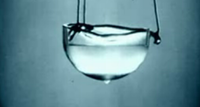
Photo from wikipedia
High indoor humidity/temperature pose serious public health threat and hinder industrial productivity, thus adversely impairing the wellness and economy of the entire society. Traditional air conditioning systems for dehumidification and… Click to show full abstract
High indoor humidity/temperature pose serious public health threat and hinder industrial productivity, thus adversely impairing the wellness and economy of the entire society. Traditional air conditioning systems for dehumidification and cooling involve significant energy consumption and have accelerated the greenhouse effect. Here, this work demonstrates an asymmetric bilayer cellulose‐based fabric that enables solar‐driven continuous indoor dehumidification, transpiration‐driven power generation, and passive radiative cooling using the same textile without any energy input. The multimode fabric (ABMTF) consists of a cellulose moisture absorption–evaporation layer (ADF) and a cellulose acetate (CA) radiation layer. The ABMTF exhibits a high moisture absorption capacity and water evaporation rate, which quickly reduces the indoor relative humidity (RH) to a comfortable level (40–60% RH) under 1 sun illumination. The evaporation‐driven continuous capillary flow generates a maximum open‐circuit voltage (Voc) of 0.82 V, and a power density (P) up to 1.13 µW cm−3. When a CA layer with high solar reflection and mid‐infrared (mid‐IR) emissivity faces outward, it realizes subambient cooling of ≈12 °C with average cooling power of ≈106 W m−2 at midday under radiation of 900 W m−2. This work brings a new perspective to develop the next‐generation, high performance environmentally friendly materials for sustainable moisture/thermal management and self‐powered applications.
Journal Title: Advanced Science
Year Published: 2023
Link to full text (if available)
Share on Social Media: Sign Up to like & get
recommendations!